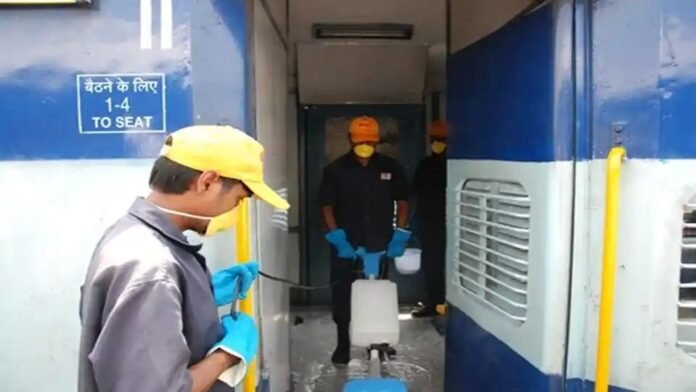New Delhi, October 2024 – Indian Railways, the world’s fourth-largest railway network, has long been a critical part of daily transportation for millions of Indians. However, recent concerns have surfaced over the hygiene practices surrounding one essential amenity provided to passengers in air-conditioned (AC) coaches – woolen blankets. It has come to light that the woolen blankets provided in AC coaches are washed only once or twice a month, leading to discomfort among passengers and raising questions about hygiene standards.
Blanket Washing Schedule: Once or Twice a Month
The woolen blankets provided in Indian Railways’ AC coaches, used by passengers during overnight journeys, are a standard part of the bedding set, which also includes sheets and pillow covers. While the bed sheets and pillow covers are washed daily after each use, the blankets are not subject to the same frequency of cleaning. According to Indian Railways officials, the current practice involves washing these woolen blankets only once or, in some cases, twice a month.
This washing schedule has triggered concern among passengers, who question the hygiene of blankets that are used by multiple people over extended periods without regular cleaning. With trains often running at full capacity, particularly during peak travel seasons, blankets in AC coaches see heavy use, making the issue even more pressing.
Hygiene Concerns and Passenger Feedback
Hygiene is a major concern for passengers using public transport, and Indian Railways is no exception. Passengers who travel in AC coaches expect clean and hygienic bedding, particularly during long journeys that involve overnight stays. However, many have expressed dissatisfaction over the condition of the blankets provided. Complaints of unpleasant odors, stains, and discomfort due to unwashed blankets have become common across various railway zones.
Several passengers have taken to social media to voice their concerns, sharing images and experiences of being provided with blankets that were visibly unclean. While Indian Railways has been working to improve its overall services, cleanliness and hygiene in AC coaches continue to be a challenge, with the irregular washing schedule of blankets emerging as a key issue.
In interviews with regular train travelers, many pointed out that while they appreciate the effort to provide basic amenities, the infrequent washing of blankets detracts from their overall travel experience. “We expect clean bedding, especially in AC coaches where tickets are more expensive,” said Sunita Sharma, a frequent traveler. “It’s uncomfortable to sleep with a blanket that hasn’t been washed for weeks, especially in shared spaces.”
Indian Railways’ Response and Challenges
Indian Railways has acknowledged the concerns raised by passengers but has cited logistical and operational challenges in washing woolen blankets more frequently. Woolen blankets, due to their fabric and bulk, require special washing and drying procedures, which are more resource-intensive compared to regular bed sheets and pillow covers. The large number of trains and the high volume of passengers also make it difficult to manage blanket washing at a more frequent pace.
One railway official explained, “Unlike bed sheets and pillow covers, which can be washed daily at linen depots, woolen blankets are washed using industrial washing machines, and the process takes more time and resources. Increasing the washing frequency would require significant investment in infrastructure and logistics, which we are working towards.”
Despite these challenges, Indian Railways has promised to explore solutions that can address the issue more effectively. One possible approach being considered is the gradual replacement of woolen blankets with lightweight, easy-to-wash alternatives, such as fleece blankets, which can be cleaned more frequently and at lower costs. Some zones have already started experimenting with this shift, particularly on premium trains like the Rajdhani Express.
Proposed Improvements and Long-Term Solutions
To improve passenger comfort and hygiene, Indian Railways is also considering the introduction of disposable or single-use blankets, especially for shorter routes. Disposable blankets, while not as durable as woolen ones, could offer a more hygienic alternative for passengers concerned about cleanliness. These blankets could be provided in sealed packaging, ensuring that each passenger receives a clean blanket during their journey.
Another potential solution is offering passengers the option to rent or purchase blankets for their trip. While some passengers may not mind using the provided blankets, others who prioritize hygiene may prefer to have a fresh, unused blanket, even if it comes at an additional cost.
Additionally, Indian Railways is exploring ways to enhance the efficiency of its linen management system. This could involve upgrading existing laundry facilities, increasing the number of washing cycles, and optimizing the distribution of cleaned blankets across different railway zones.
The washing schedule for woolen blankets in Indian Railways’ AC coaches has highlighted a significant gap in the system’s hygiene practices, raising legitimate concerns among passengers. While Indian Railways continues to grapple with the logistical challenges of managing bedding on such a large scale, the need for improvement is clear. With passenger comfort and cleanliness becoming more critical in an increasingly health-conscious society, Indian Railways must prioritize finding solutions that address these hygiene issues while maintaining the quality of service that millions of travelers depend on.
As Indian Railways explores alternative options such as replacing woolen blankets with lighter, more washable materials or introducing disposable bedding, passengers can hope for a cleaner and more comfortable travel experience in the near future.

